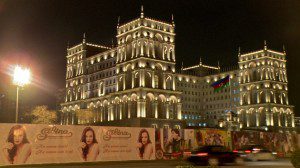The price of dissent in Kazakhstan
 In recent weeks, Kazakh authorities closed down almost all independent media, and gave prosecutors new, wider legal powers against free speech. Protests against these latest attacks must go hand-in-hand with the defence of prisoners of conscience such as the poet and writer Aron Atabek, say his family and friends.
In recent weeks, Kazakh authorities closed down almost all independent media, and gave prosecutors new, wider legal powers against free speech. Protests against these latest attacks must go hand-in-hand with the defence of prisoners of conscience such as the poet and writer Aron Atabek, say his family and friends.
They warn that Atabek’s latest sentence — two years of solitary confinement for “insubordination” to prison authorities, on top of the 18 years he is serving for “orchestrating mass disorder” — puts his life in danger.
In mid-December, as Atabek was transferred back to the Arkalyk prison in Kostanai region to serve the two years, his son Askar Aidarkhan wrote to international campaign groups urging them to protest against his ill treatment.
Since being jailed in 2007, Atabek has frequently been deprived of proper food and water, access to fresh air and sunlight, as well as access to sports facilities and writing materials. He has also had manuscripts confiscated.
Atabek became a dissident writer and political activist in Soviet times, and has been a vocal critic of Kazakh president Nursultan Nazarbayev since then. In December 1986 he participated in the Zheltoksan demonstration, the first open protest against Soviet dictatorship to be held in Kazakhstan, and afterwards campaigned for the truth about those killed when the security services broke it up.
In 1992, shortly after Kazakhstan became independent, Atabek was given political asylum in Azerbaijan after publishing opposition newspapers. He returned to Kazakhstan in 1996 and since then published novels, plays and poems as well as political articles critical of the government.
Atabek’s 18-year jail sentence was imposed in 2007 after he took up the case of shanty-town dwellers at Shanyrak outside Almaty whose homes were destroyed in a violent, illegal police operation. Twenty-three other activists and shanty-town dwellers were jailed for between one and 14 years on a variety of charges.
Atabek’s family sees a pattern of protest and reaction. In 2007, the shanty-town dwellers resisted the Almaty authorities’ attempts to destroy their community — and Atabek was punished for supporting them. In 2011, oil workers in western Kazakhstan staged nine months of strikes and protests, culminating in the massacre of 16 of them by police at Zhanaozen — and retribution has been visited on politicians and media who highlighted the strikers’ plight.
Askar Aidarkhan, Atabek’s son, has said that “what is happening in Kazakhstan now [in the aftermath of the Zhanaozen massacre] follows on from what happened at Shanyrak”.
Shanyrak became a sanctuary for homeless families during the rapid expansion of Almaty in the early 2000s. It is estimated that when it was destroyed it comprised more than 2000 dwellings with up to 10,000 residents.
The notorious clearance of Shanyrak took shortly after the promulgation on 5 July 2006 of the law “On Amnesty and Legalisation of Property”. The city authorities, citing shanty-town dwellers’ failure to register their properties correctly, ordered them to leave. Atabek and other oppositionists argued that the real reason was that the authorities wanted to make the land available to property developers.
Atabek lobbied parliamentarians, wrote articles, organised petitions and reminded the shanty-town dwellers of constitutional rights that protected them. But pleas by Atabek and other activists went unheeded. The police tried to clear the shanty-town forcibly, and a violent clash ensued in which an officer died. A round-up of activists followed.
Atabek was tried and convicted in October 2007 of “orchestrating mass disorder” — despite there being no evidence that he was nearby when the clashes occurred. He was offered a pardon in exchange for admitting guilt, but he vehemently refused.
The poet has continued to write in prison, detailing illegal and inhumane prison conditions on his website, which was set up by friends and family to whom he sent his writings. He has faced constant restrictions on visitors and had manuscripts confiscated. Before his current two-year sentence solitary, Atabek served a previous two-year period in a punishment cell (February 2010 to February 2012), for refusing to wear a prison uniform and other offences against prison rules.
Atabek’s son said in an email message to friends and supporters that his father’s health is suffering, and that he feared for his father’s life after the recent on-line publication of a book by him criticising Kazakh Nursultan Nazarbayev and other powerful figures in Kazakhstan.



